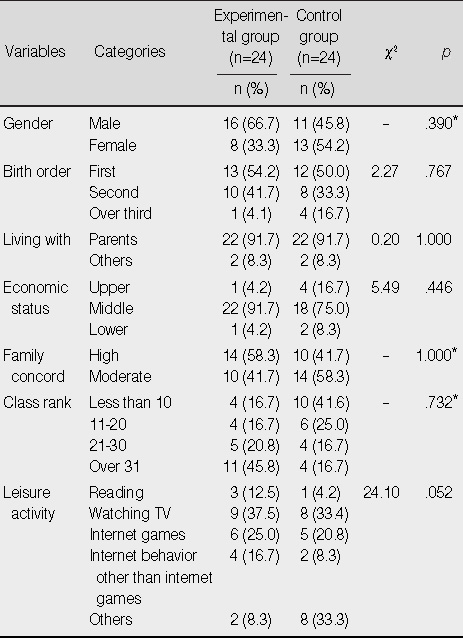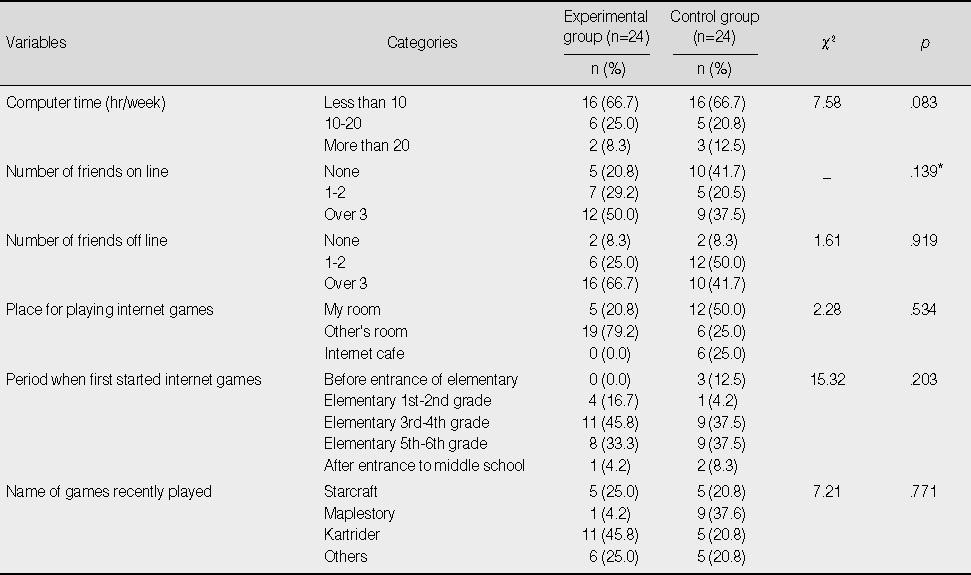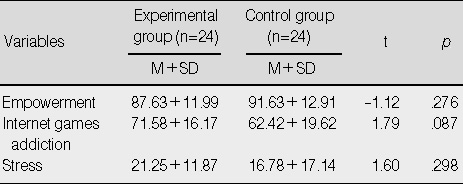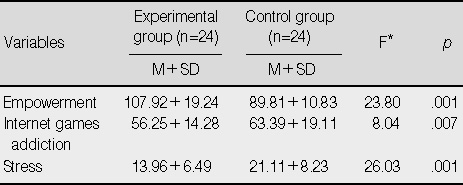Articles
- Page Path
- HOME > J Korean Acad Nurs > Volume 40(2); 2010 > Article
-
Original Article
- Effects of an Empowerment Education Program in the Prevention of Internet Games Addiction in Middle School Students
- Aeran Joo, Inhyae Park
-
Journal of Korean Academy of Nursing 2010;40(2):255-263.
DOI: https://doi.org/10.4040/jkan.2010.40.2.255
Published online: April 30, 2010
1Assistant Professor, Department of Nursing, Chodang University, Muan, Korea.
2Professor, College of Nursing, Chonnam National University, Gwangju, Korea.
- Address reprint requests to: Joo, Aeran. Department of Nursing, Chodang University, 419 Muan-eup, Muan 534-701, Korea. Tel: 82-61-450-1807, Fax: 82-61-450-1801, arjoo@chodang.ac.kr
Copyright © 2010 Korean Society of Nursing Science
Figure & Data
REFERENCES
Citations

- Gender differences in problematic gaming among Chinese adolescents and young adults
Zhenjiang Liao, Juan Le, Xinxin Chen, Ying Tang, Hongxian Shen, Qiuping Huang
BMC Psychiatry.2025;[Epub] CrossRef - Effectiveness of Non-Pharmacological Interventions on Gaming Disorder: A Systematic Review and Meta-Analysis
Chan-Myung Ock, Hyung-Suk Lee, Jisoo Chae, Hyekyeong Kim
Psychiatry Investigation.2025; 22(5): 490. CrossRef - Over-gaming burns me out: The indirect role of academic procrastination between digital game addiction severity and school burnout among adolescents
Bilal Kaya, Ayşe Sarpkaya
School Psychology International.2025; 46(5): 499. CrossRef - Treatment effects of therapeutic interventions for gaming disorder: A systematic review and meta-analysis
Paul A. Danielsen, Rune A. Mentzoni, Torstein Låg
Addictive Behaviors.2024; 149: 107887. CrossRef - The Kusa manga, a secondary prevention program for cannabis use in adolescence based on emotional regulation: Preliminary data
Céline Bonnaire, Alexandre Har, Zéphyr Serehen, Olivier Phan
European Review of Applied Psychology.2023; 73(5): 100902. CrossRef - The effect of gamification-based training on the knowledge, attitudes, and academic achievement of male adolescents in preventing substance and internet addiction
Esmaeel Taghipour, Fatemeh Vizeshfar, Nahid Zarifsanaiey
BMC Medical Education.2023;[Epub] CrossRef - The effectiveness of prevention programs for problematic Internet use in adolescents and youths: A systematic review and meta-analysis
Silvana Melissa Romero Saletti, Stephan Van den Broucke, Cecilia Chau
Cyberpsychology: Journal of Psychosocial Research on Cyberspace.2021;[Epub] CrossRef - Youth Internet Safety Education: Aligning Programs With the Evidence Base
David Finkelhor, Kerryann Walsh, Lisa Jones, Kimberly Mitchell, Anne Collier
Trauma, Violence, & Abuse.2021; 22(5): 1233. CrossRef - School-based Prevention for Adolescent Internet Addiction: Prevention is the Key. A Systematic Literature Review
Melina A. Throuvala, Mark D. Griffiths, Mike Rennoldson, Daria J. Kuss
Current Neuropharmacology.2019; 17(6): 507. CrossRef - LA PRÉVENTION DE L’UTILISATION PROBLÉMATIQUE D’INTERNET : EXPLORATION DU POINT DE VUE DES JEUNES
Gabrielle St-Arnaud, Magali Dufour1, Andrée-Anne Légaré, Joël Tremblay, Karine Bertrand, Yasser Khazaal, Natacha Brunelle, Mathieu Goyette
Revue québécoise de psychologie.2019; 40(2): 115. CrossRef - Effects of a prevention intervention concerning screens, and video games in middle-school students: Influences on beliefs and use
Céline Bonnaire, Zéphyr Serehen, Olivier Phan
Journal of Behavioral Addictions.2019; 8(3): 537. CrossRef - Association between internet gaming addiction and leukocyte telomere length in Korean male adolescents
NaHyun Kim, Jin Young Sung, Joo Yeon Park, In Deok Kong, Tonda L. Hughes, Dae-Kwang Kim
Social Science & Medicine.2019; 222: 84. CrossRef - Policy and Prevention Approaches for Disordered and Hazardous Gaming and Internet Use: an International Perspective
Daniel L. King, Paul H. Delfabbro, Young Yim Doh, Anise M. S. Wu, Daria J. Kuss, Ståle Pallesen, Rune Mentzoni, Natacha Carragher, Hiroshi Sakuma
Prevention Science.2018; 19(2): 233. CrossRef - Effects of a prevention program for internet addiction among middle school students in South Korea
Sun‐Yi Yang, Hee‐Soon Kim
Public Health Nursing.2018; 35(3): 246. CrossRef - Prevention and Policy Related to Internet Gaming Disorder
Daniel L. King, Paul H. Delfabbro
Current Addiction Reports.2017; 4(3): 284. CrossRef - Effects of Academic Stress in Middle School Students on Smartphone Addiction: Moderating Effect of Self-esteem and Self-control
Il Ok Kim, Sun Hwa Shin
Journal of Korean Academy of Psychiatric and Mental Health Nursing.2016; 25(3): 262. CrossRef - Mediation Effects of Self regulation and Hopelessness between Self efficacy and Internet game addiction in Middle School Students
Bo Young Kim
Journal of Korean Public Health Nursing.2015; 29(3): 441. CrossRef - Regular gaming behavior and internet gaming disorder in European adolescents: results from a cross-national representative survey of prevalence, predictors, and psychopathological correlates
K. W. Müller, M. Janikian, M. Dreier, K. Wölfling, M. E. Beutel, C. Tzavara, C. Richardson, A. Tsitsika
European Child & Adolescent Psychiatry.2015; 24(5): 565. CrossRef - Effects of an Integrated Internet Addiction Prevention Program on Elementary Students' Self-regulation and Internet Addiction
So Youn Mun, Byoung Sook Lee
Journal of Korean Academy of Nursing.2015; 45(2): 251. CrossRef - Pathways From Family Strengths and Resilience to Internet Addiction in Male High School Students: Mediating Effect of Stress
Jeong Nam Jang, Yeon Hee Choi
Journal of Korean Public Health Nursing.2012; 26(3): 375. CrossRef - Family Function and Internet Addiction in Lower Grade Elementary School Students
Eun-Sook Jung, Moon-Sook Shim
Journal of Korean Public Health Nursing.2012; 26(2): 328. CrossRef - The screens culture: impact on ADHD
Margaret D. Weiss, Susan Baer, Blake A. Allan, Kelly Saran, Heidi Schibuk
ADHD Attention Deficit and Hyperactivity Disorders.2011; 3(4): 327. CrossRef - Applications of the Participatory Learning Process in Health Promotion
Jang-Rak Kim, Baek-Geun Jeong, Ki-Soo Park, Yune-Sik Kang
Journal of agricultural medicine and community health.2011; 36(2): 130. CrossRef - A Study on the Relationship between Family Stress and Health Promoting Behavior of the Dual Earner Couples
Ae-Ran Joo
Korean Journal of Occupational Health Nursing.2011; 20(2): 221. CrossRef - Effects of a Group Counseling Integration Program on Self-determination and Internet Addiction in High School Students with Tendency to Internet Addiction
Gyeong Ran Park, Hee Sook Kim
Journal of Korean Academy of Nursing.2011; 41(5): 694. CrossRef
Overview of Empowerment Education Program
Homogeneity Test of General Characteristics
*Fisher exact test.
Homogeneity Test of Internet Games-related Characteristics
*Fisher exact test.
Homogeneity Test of Dependent Variables between Experimental and Control group
Group Comparisons on Empowerment, Internet games addiction, and Stress at Posttest
*F score is from Analysis of Covariance with pretest scores as covariates.
*Fisher exact test.
*Fisher exact test.
*F score is from Analysis of Covariance with pretest scores as covariates.
 KSNS
KSNS
 E-SUBMISSION
E-SUBMISSION





 Cite
Cite

